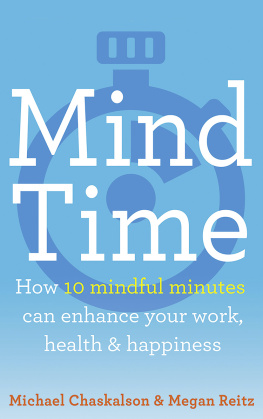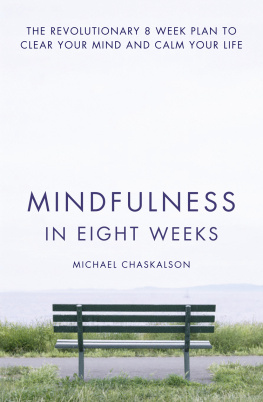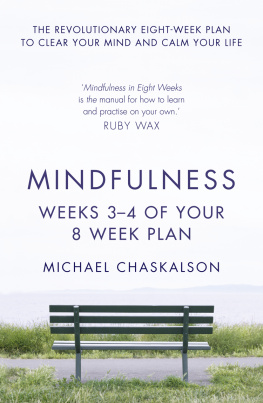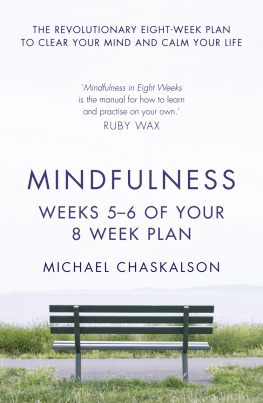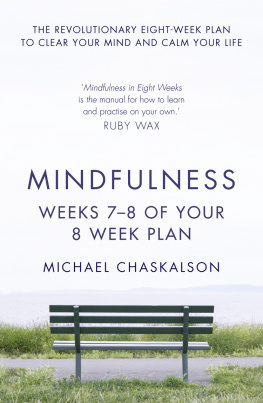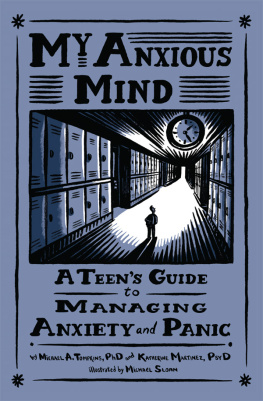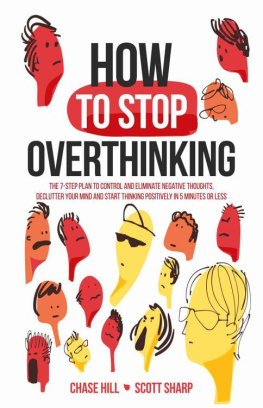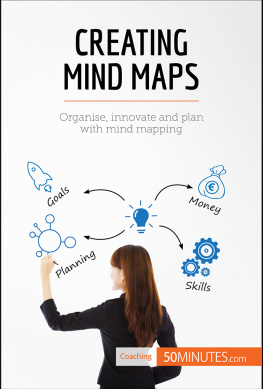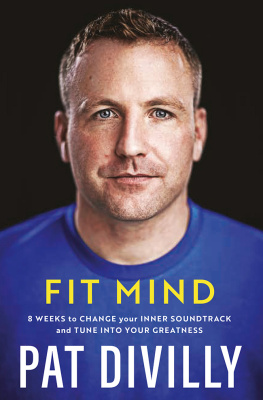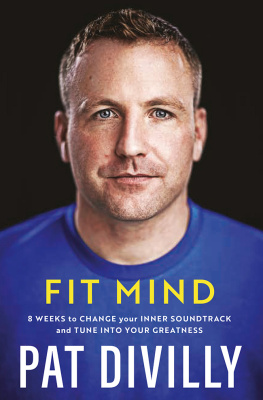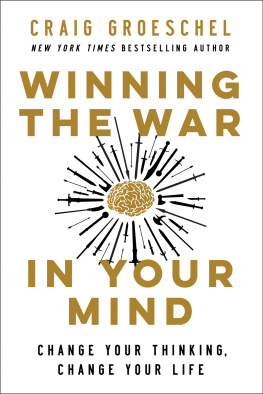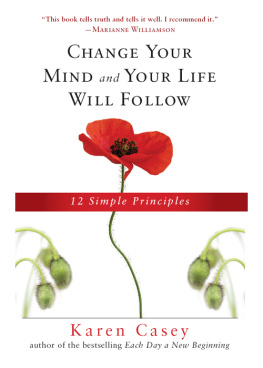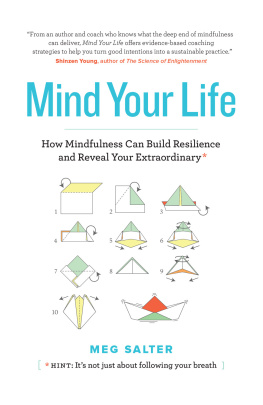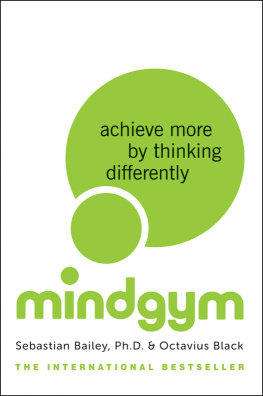Thorsons
An imprint of HarperCollinsPublishers
1 London Bridge Street
London SE1 9GF
www.harpercollins.co.uk
This edition published by Thorsons 2018
FIRST EDITION
Text Michael Chaskalson and Megan Reitz 2018
Cover layout design HarperCollinsPublishers Ltd 2018
A catalogue record of this book is available from the British Library
Michael Chaskalson and Megan Reitz assert the moral right to be identified as the authors of this work
All rights reserved under International and Pan-American Copyright Conventions. By payment of the required fees, you have been granted the nonexclusive, non-transferable right to access and read the text of this e-book on screen. No part of this text may be reproduced, transmitted, downloaded, decompiled, reverse engineered, or stored in or introduced into any information storage retrieval system, in any form or by any means, whether electronic or mechanical, now known or hereinafter invented, without the express written permission of HarperCollins e-books.
Find out about HarperCollins and the environment at
www.harpercollins.co.uk/green
Source ISBN: 9780008252809
Ebook Edition March 2018 ISBN: 9780008252816
Version: 2018-01-12
Michael
For Annette
and for Ellie, Chloe, Ollie and Scarlett
Megan
For Steve, Mia and Lottie
and John, Rachel and Doug Goodge
A llowing
I nquiry
M eta-awareness
Contents
Your mind is extraordinary. Your mind. The mind that, right now, sees black marks on white paper and effortlessly turns them into bundles of meaning. The same mind that sees the word sunset and fluently converts it into an inner vision of colours and shades. Without even trying.
How extraordinary. How miraculous.
To perform its amazing feats, your mind has an information-processing capacity greater than the combined power of all the computers, routers and Internet connections on Earth. Did you know, for example, that a tiny piece of your brain, the size of a grain of sand, contains 100,000 neurons and 1 billion synapses all communicating with each other. The brain is the minds supercomputer. It can connect 100 trillion bits of information.
So with this amazing capacity available to us, how do we use our minds?
The simple answer is, not as well as we might. For a start, about half the time we are awake we are thinking about something other than what is going on at the time.
Then there are all the things our minds do on autopilot. Do you wake up in the morning and reach for your phone, blearily checking your emails while still lying in bed? Do you sit in traffic on your way to work scowling when someone beeps their horn, without even considering that they might be trying to tell you something useful?
The fact is that we are only aware of a tiny fraction of what we are thinking, feeling and sensing so were barely conscious of how and why we behave the way we do. Its as if we have a large, elegant, state-of-the-art ocean-going cruise liner at our command and all we use it for is chugging about the harbour.
The problem is that although we have all that enormous potential at our disposal, our minds dont come with an instruction manual. As miraculous as they are, we dont know how to use them to anything like their full capacity. All we get is some rudimentary guidance.
Weve all been educated to some extent. Weve learned to do calculations and construct sentences; weve maybe learned history, geography, science, technology, languages or commerce. We can cook and shop, work the Internet and drive a car. We can do our jobs. We might even have mastered some of these to a very high level. But its not the same. We still dont use or direct our minds effectively. And that affects the way we relate to others, the way we feel, the way we think and the way we experience the world around us.
Most of the time our minds just run on automatic and were barely aware that theyre doing that. This keeps us confined in the narrow space of our habits. Mentally, emotionally and in our behaviours, we keep doing what weve always done and we keep getting what weve always got. Sometimes we manage to break out into new ways of doing things. But often, with a sad predictability, these new resolutions and good intentions dont last and we flip back to automatic again.
Thats the bad news. The good news is that we can do so much better, and its not that hard. We just need to know how to use our minds more effectively.
This book sets out to help you get your mind out of automatic more often. The training programmes weve led throughout the world and our research tell us that its possible for us all to do this and when we do so life goes much better. We become more resilient, we have stronger relationships and were better able to manage unexpected events. We feel more awake, more alive and more creative. And thats because we are!
Everything that happens as we go about our day shapes and changes our minds in subtle (or less subtle) ways. A difficult telephone call leaves us feeling a bit low; a cheerful remark leaves us feeling more buoyant. The mind is a kind of liquid lens. Its always moving and changing, and as it shifts the world that it perceives also shifts. There are still houses, streets and trees out there, but the quality of our experience alters.
The important point is this. You can leave that process to chance, letting your mind be randomly shaped and changed by passing events, or you can get more involved in the process and help to direct it. There are simple things you can do every day to help you shape your mind so that whatever life brings youre better able to respond creatively.
And the even better news is that it only takes 10 minutes a day. Yes, just 10 short minutes. We call that Mind Time, and we all need it.
If you can set aside 10 minutes each day to engage in a few simple practices,and if you really follow the advice weve given about doing them, then in a few months things should get better. Thats our promise to you. But you have to commit the 10 minutes of your day. No one else can do that for you.
The fact that you picked up this book suggests that you are looking for something to make your life better. The question is: are you ready to embark on a fascinating and literally mind-expanding journey? We hope so. The upside is huge.
We will introduce you to your own mind so that you can begin to see more clearly how it works. Well show you some of the levers you can pull so that you can begin to shape your mind more as you want it. Well teach you how to stand back a little just a tiny bit so that you can see what your mind is up to more often, and that will allow you to make more powerful choices about where you want it to go.
In the first chapter, well lay out the problem more fully and suggest some solutions. Well discuss the research we conducted and introduce some simple practices that you can do every day. These will help you develop three key capacities, which we collectively refer to as AIM:
- Allowing an attitude of kindness and acceptance.
- Inquiry a curiosity about your present-moment experience.
- Meta-awareness the ability to observe your thoughts, feelings, sensations and impulses as they are happening and see them as temporary and not facts.
AIM will help you to become more alive and aware of yourself, of others and of the world around you. And that greater awareness gives you more choices. Thats what AIM is all about choiceful response rather than choiceless reaction.
The elements of AIM are mapped out in Chapter 1. Allowing and Inquiry are more easily understood though the devil is in the practice. Meta-awareness is more obviously challenging. Meta means beyond or at a higher level. So we are referring to a specific type of awareness. It describes a particular way of

